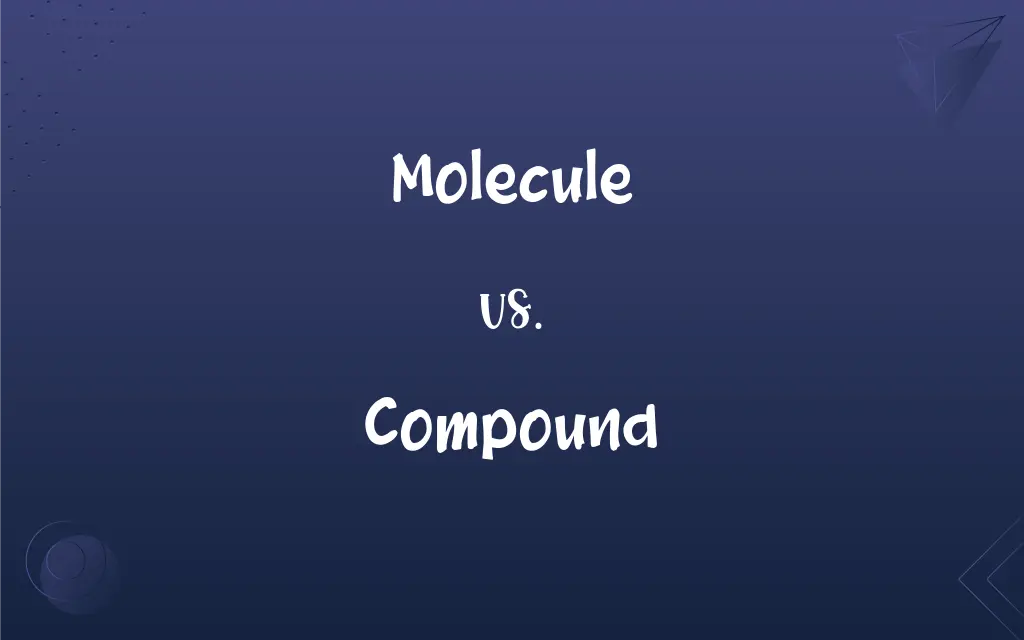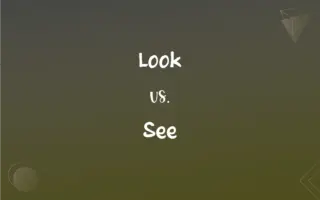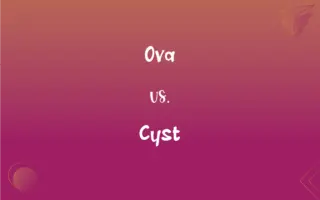Molecule vs. Compound: What's the Difference?
Edited by Janet White || By Harlon Moss || Updated on October 20, 2023
A molecule is two or more atoms bonded together, while a compound consists of two or more different elements chemically combined.

Key Differences
Molecules and compounds are fundamental concepts in the realm of chemistry, but they carry distinct definitions. A molecule refers to two or more atoms that have bonded together. These atoms can be of the same or different elements. For example, a molecule of oxygen gas (O2) consists of two oxygen atoms bonded together.
On the other hand, a compound specifically pertains to a substance formed when two or more different elements are chemically bonded together. This means that while all compounds are molecules, not all molecules are compounds. For instance, water (H2O) is a compound because it has two hydrogen atoms and one oxygen atom chemically combined.
The notion of bonding is inherent in the definition of a molecule. Atoms within a molecule are held together by strong covalent bonds. In contrast, compounds may form through various types of bonds, including covalent, ionic, and metallic bonds, depending on the elements involved.
Another distinguishing factor is that compounds typically have properties different from the individual elements that constitute them. For example, sodium (a metal) and chlorine (a gas) are both hazardous, but when combined, they form table salt (sodium chloride), which is essential for human consumption. In contrast, the properties of molecules might be very similar or different from their constituent atoms based on the molecule's nature.
It's important to note that while molecules can exist as discrete units (like an individual molecule of O2), compounds often exist in repetitive structures, especially when formed through ionic bonds, as seen in salt crystals.
ADVERTISEMENT
Comparison Chart
Definition
Two or more atoms bonded together.
Two or more different elements chemically combined.
Bonding
Always covalent bonding between atoms.
Can be covalent, ionic, or metallic bonding between elements.
Constituent Elements
Can be same or different.
Always different.
Examples
O2, H2
H2O, NaCl
Properties
Can be similar or different from constituent atoms.
Typically different from constituent elements.
ADVERTISEMENT
Molecule and Compound Definitions
Molecule
A group of atoms bonded together.
Oxygen gas is a molecule consisting of two oxygen atoms.
Compound
A mixture of atoms in a fixed ratio joined by chemical bonds.
Carbon dioxide is a compound with one carbon and two oxygens.
Molecule
A particle consisting of two or more atoms.
A molecule of carbon dioxide contains one carbon and two oxygen atoms.
Compound
A material where atoms of different elements bond chemically.
Salt is a compound derived from sodium and chlorine.
Molecule
A distinct entity formed by the union of atoms.
Each molecule of methane contains one carbon atom.
Compound
A substance formed from two or more elements.
Water is a compound made from hydrogen and oxygen.
Molecule
A combination of atoms in a set ratio.
The molecule of glucose comprises six carbons, twelve hydrogens, and six oxygens.
Compound
An entity with a unique set of chemical properties distinct from its elements.
Rust is a compound formed when iron reacts with oxygen.
Molecule
The smallest unit of a substance retaining its chemical properties.
A molecule of water has a unique set of properties.
Compound
A combination of two or more different atoms.
Ammonia is a compound consisting of nitrogen and hydrogen.
Molecule
The smallest particle of a substance that retains the chemical and physical properties of the substance and is composed of two or more atoms; a group of like or different atoms held together by chemical forces.
Compound
To combine so as to form a whole; mix
Tin was often compounded with lead to make pewter.
FAQs
Can a molecule exist independently?
Yes, molecules can exist as discrete units.
What's the basic definition of a molecule?
A molecule is two or more atoms bonded together.
Can a compound be a molecule?
Yes, all compounds are molecules, but not all molecules are compounds.
Do molecules always contain atoms of the same element?
No, molecules can consist of the same or different elements.
Are the properties of a compound similar to its individual elements?
Typically, compounds have properties different from their constituent elements.
Is every group of atoms a molecule?
Only if the atoms are bonded together covalently.
Can compounds form from only one type of atom?
No, compounds consist of two or more different atoms.
Can elements be separated easily from compounds?
No, separating elements in a compound usually requires a chemical reaction.
Are molecules visible to the naked eye?
Individual molecules are microscopic, but collections of them, like gas, can be visible.
How are atoms in a molecule held together?
They are held by covalent bonds.
Do compounds have a specific geometric structure?
Yes, compounds have defined shapes based on the type and number of atoms.
Is it possible for a molecule to be made of a single atom?
No, a molecule must consist of at least two atoms.
What's an example of a molecule that's not a compound?
O2, since it consists of two atoms of the same element.
How can one differentiate between a molecule and a mixture?
Molecules are chemically combined, while mixtures are physically combined.
Can compounds have the same molecular and empirical formulas?
Yes, but not always. For instance, water (H2O) has the same molecular and empirical formula.
What bonds are present in compounds?
Compounds can have covalent, ionic, or metallic bonds.
What is a molecular formula?
It's a representation of the number and type of atoms in a molecule.
Can the ratio of elements in a compound vary?
No, compounds always have a fixed ratio of elements.
What are molecular compounds?
They are compounds where atoms are joined by covalent bonds.
What determines the properties of a compound?
The type and arrangement of its atoms determine its properties.
About Author
Written by
Harlon MossHarlon is a seasoned quality moderator and accomplished content writer for Difference Wiki. An alumnus of the prestigious University of California, he earned his degree in Computer Science. Leveraging his academic background, Harlon brings a meticulous and informed perspective to his work, ensuring content accuracy and excellence.
Edited by
Janet WhiteJanet White has been an esteemed writer and blogger for Difference Wiki. Holding a Master's degree in Science and Medical Journalism from the prestigious Boston University, she has consistently demonstrated her expertise and passion for her field. When she's not immersed in her work, Janet relishes her time exercising, delving into a good book, and cherishing moments with friends and family.































































